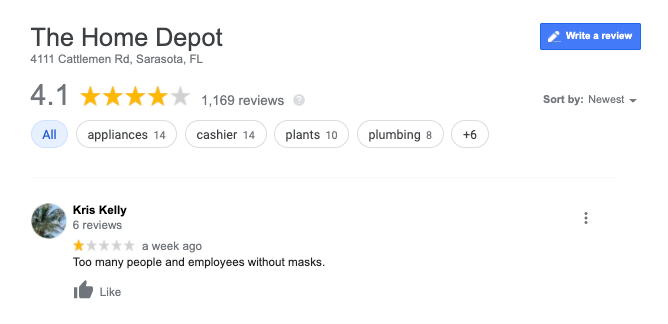Who Should Monitor Your Online Reviews?

These days, there are a lot of ways consumers share their feedback about products and experiences. But one method that’s growing in popularity is writing reviews. 50% of shoppers wrote reviews for at least one product they purchased in 2018 (PowerReviews). In comparison, 42% of shoppers wrote at least one review in 2014.
Brands can’t just sit back while these reviews pour in, though. Instead, they must actively manage this content.
Why it’s Essential to Monitor Your Reviews
Monitoring reviews is essential for a number of reasons.
For starters, it’s an important step in managing your brand’s online reputation. After all, a single bad review could cause some serious damage if you don’t take action on it. And you can’t take action if you don’t even know it exists. Take a look at this one-star review for a hair care product that mentions some pretty scary side effects. There’s a good possibility this could be a larger issue affecting other consumers, too. If the brand doesn’t see the review, they’re putting their customers at risk — and their reputation is on the line, too.

Monitoring your reviews is also a great way to understand what your shoppers love about your products — and what they don’t. You can use these insights to drive improvements to products and experiences, and these changes can boost your bottom line. Finally, when you actively monitor your reviews, you get plenty of opportunities to make authentic connections with your shoppers. When you get a negative review like the one below, you have the chance to turn a bad situation around. When you get a positive review, responding can show the shopper (and future ones) that you value their feedback. And that drives repeat business.

Who Should be Responsible for Monitoring Reviews?
Here at Reputation Studio, of the questions we get most often is: “Who exactly should be tasked with monitoring and responding to reviews?”
There’s no one-size-fits-all answer. Instead, it depends on a lot of different factors, including your company size and industry — just to name a few.
Of course, you’ll want to choose a team that has a strong customer care mindset and is empowered and equipped to solve customers’ issues. It’s also important that the members of the chosen team have strong writing skills for drafting responses to reviews (although it’s worth noting that if you’re a Reputation Studio customer, you can provide these team members with templates to use as a starting point).
Ultimately, you’ve got to decide what’s right for your business. But to help you decide, let’s take a closer look at four of the teams that are commonly charged with monitoring reviews — and why each option might make sense for your business.
The Customer Service Team
At many companies, customer service or customer care teams are tasked with monitoring and responding to reviews. And for good reason. These teams are laser-focused on customer satisfaction and are specially trained to solve problems, whether they come through phone, live chat, email or another channel. They also have access to tools — such as a customer support application like Salesforce Service Cloud — that provide other relevant information about a given customer. That information customer care reps to deliver more personalized service. This is important, as according to Salesforce, 84% of customers say being treated like a person — rather than a number — is very important. And 59% value tailored engagement based on past interactions.
Finally, customer service reps are typically well-versed in different types of common customer issues. They likely see the same types of issues on a regular basis, and as a result, they can resolve the majority of customer problems quickly. That’s important, because when it comes to responding to reviews (especially negative ones), time is of the essence.
The eCommerce Team
As the name suggests, eCommerce teams are focused on driving eCommerce sales. And they’re always looking for ways to boost sales.
Reviews are proven to drive eCommerce sales. According to our friends at Bazaarvoice, a single review can increase purchases of a product by 10%. And 100 reviews can increase purchases by 37%. So it makes sense that at many companies, the eCommerce team is responsible for monitoring and responding to reviews.
There are a number of reasons this approach makes sense. By monitoring reviews, the eCommerce team can better understand how this content is driving sales — and how it should be optimized. For example, they can test the placement of reviews on a product page to see how it impacts engagement and conversion. What’s more, the eCommerce team can share feedback from reviews with the right teams to drive improvements throughout the company. For example, let’s say the eCommerce team and a jewelry brand notice there are several reviews for a watch that mention a faulty clasp. They can share this feedback with the product development team, who can then make improvements to the product. Or, if the eCommerce team sees reviews that mention inaccuracies in a product’s description, they can share that feedback with the copywriting team who can then update the description.
The Store or Location Manager
If you collect location-based reviews — such as reviews for hotels, retail stores or restaurants — you might be wondering who is best equipped to monitor reviews. In these cases, the store manager is often your best bet. After all, this person knows the ins and outs of their store best. What’s more, they’re “on the ground” and can quickly investigate issues raised in reviews and make and enforce necessary changes.
For example, the manager of this home improvement store might notice several reviews like this one that mentions employees failing to wear masks. The manager can then take action to increase mask adoption at the store. For example, they can hang reminders in the employee break room and mention the store’s mask policy during team meetings.

A Third Party
Continuously monitoring and responding to reviews can be time-consuming — especially when you have a high volume of this content coming in. And your internal teams might already be stretched to capacity, with no time to take on this added task. If that’s the case, you might consider outsourcing review management to a third party company.
The biggest benefit of outsourcing review management is that it saves time. And that frees up your internal resources to handle other high-payoff activities.
But there are a few downsides to this approach. For starters, when you hand over the reins to a third party, you no longer have full control. So you might worry responses won’t be quick enough — or on-brand. If you’re a Reputation Studio customer, you can provide review response templates, though, which makes this a less significant concern.
Also, when you outsource your review management, the right feedback might not get into the right hands. For example, there might be several reviews for a product that mention a big flaw you weren’t aware of. But if you aren’t monitoring the reviews yourself, this important feedback may never land on the desk of those who can fix it.
Take Control of your Online Reputation
Today, the majority of shoppers depend on reviews to make informed purchase decisions. And nearly half of shoppers contribute reviews, too.
If you’re not already, now’s the time to start actively managing your reviews. It’s a critical way to take control of your online reputation, make authentic connections with shoppers, and uncover insights that will enable you to improve your products and experiences. One of the first steps is to choose the right team to monitor your online reviews. To take a product tour, click here.